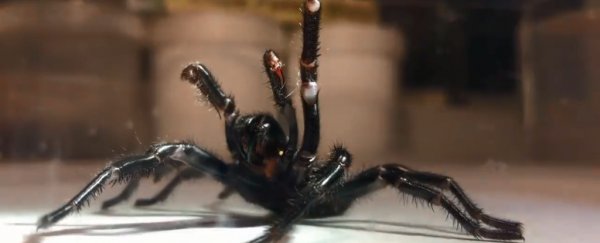This is one fellow you do NOT want to find in your shoe. The Australian Reptile Park has just been handed an absolute whopper of a male funnel web spider - not just the most toxic spider in Australia, but the entire world.
He's so big that the reptile park team have given him the most appropriate name they could think of - Colossus.
The Australian funnel web is dangerous. The venom of the most toxic of the 35 species, the Sydney funnel web, can easily kill an adult human.
To top it off, the males are not just aggressive, but likely to hide in human habitation when on the prowl for a mate.
Their deadliness also makes their venom very valuable - for making antivenom, the antidote that has ensured no one has died from a funnel web bite since 1981, even though 30-40 people are bitten every year.
That's why, instead of getting smooshed, Colossus was brought to the Australian Reptile Park, which is home to Australia's venom milking program.
He's a beauty, his legspan reaching 7.8 centimetres (3 inches). Usually, male funnel web spiders reach between 1 to 5 centimetres.
Crazy enough, he's not even the biggest of his kind to have ever been handed over to the Reptile Park - that honour goes to the fittingly named Big Boy, a male Sydney funnel web dropped off in January 2016. Big Boy's legspan reached a massive 10 centimetres (4 inches).
Both spiders are valuable to the milking program, which extracts their powerful venom once a week without killing the spiders. This is then sent to a lab to produce the antivenom.
Funnel web venom is only fatal to primates and insects. This is an unfortunate evolutionary quirk, since primates aren't funnel web prey at all - but it can also be exploited to produce the antivenom.
Rabbits, who are not affected by the venom, are injected with it and their immune systems produce antibodies against the invader without harming the animal.
These antibodies are harvested to create the antivenom, which neutralises the venom when injected into bitten humans.
January and February are the peak time of year to encounter funnel webs as the males roam in search of mates. They prefer damp, cool, humid, shady spots, which includes shoes, laundry buildings and firewood piles.
If you encounter a funnel web spider, only try to catch it if you know what you're doing. Otherwise, try calling your local pest control.
